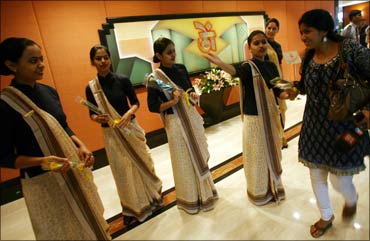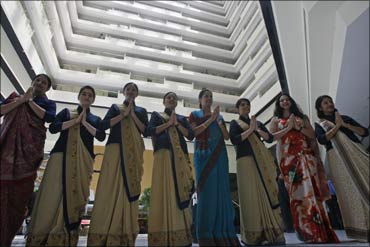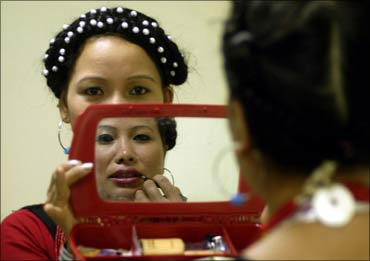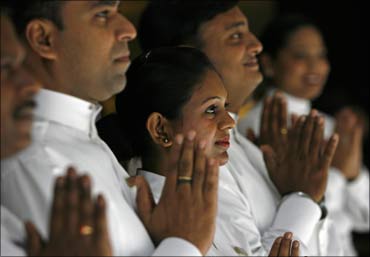
By Rrishi Raote
He's been studying all night for the IAS exam, and is just waking up.
Yet Romen Singh Kshetrimayum, 26, responds lucidly and in reasonably complete sentences via SMS, with scarcely a pause for thought: "Its [sic] the culture that we have been brought up with, i.e., helpful nature which comes from community based outlook in life. Also do the best in whatever stations you are placed in life."
The question put to him was this: "Why do people from the north-eastern states do so well in the services sector, especially in customer-facing positions?"
That they are welcomed by employers can hardly be in doubt. In the richest cities, particularly Delhi, Mumbai and Bengaluru, large and small retail outlets and eateries are often staffed partly or largely by young workers from the north-east of India.
Like other migrant groups in urban India, north-easterners face discrimination and, sometimes, violence.

In Delhi, two or three times a month an incident of rape, assault or intimidation against a north-eastern migrant is recorded by the North East Support Centre & Helpline. These attacks often take place in or near the localities where young migrants settle, such as densely-packed Moti Bagh and Munirka.
The most widely reported recent incident was the kidnap and gang-rape of a 30-year-old Mizo employee of a Gurgaon BPO on the night of November 23-24, 2010. She was seized near Moti Bagh.
Activist Madhu Chandra runs the support centre. In an essay titled 'North East Migration and Challenges in Mega Cities' on the site, he lists the factors that drive north-easterners into "mainland" urban centres. Among the "push" factors are unrest in their home states (including frequent strikes and poor infrastructure), the lack of study and work opportunities, and intercommunity conflict. Among the "pull" factors the chief one is globalisation.
Despite the unrest, Chandra writes, "people did not desire to leave their home states until globalisation reached the mega cities of India. Only then the young generation of North East India... started migrating in pursuit of employment, mostly in BPO-related companies like call centres, shopping malls, and hospitality industries... A larger number of people began migrating after 2000 and increased [sic] in last two or three years mainly in pursuit of higher studies and a hunt for employment opportunities."

Asked for numbers, Chandra says, "Nobody has an accurate number but [his organisation] did a count [in Delhi] of people coming from all eight states five years ago. We had 85,000 to 1 lakh (100,000). In the last five years it has doubled. Now we have close to 2 lakh (200,000). This includes students, government employees and the unorganised private sector."
The growth is all in private sector workers, who are 35-40 per cent of the total.
Among the smaller states, Manipur sends out the most migrants. "Manipur is the worst-affected," says Chandra, who is from Manipur.
"For educated youngsters there's no job opportunity there." Assam's size, however, means that in absolute terms it sends out more people.

Many jobs for migrants don't involve skilled labour. Shyamolee Deb, 28, from Mizoram, came to Mumbai to work after graduating from college in Pune.
In the morning she baby-sits two children, and in the evening she mans the cash counter and waits tables at a south Mumbai hookah cafe. Both pay well.
She earns about Rs 9,000 from babysitting and Rs 10,000 plus tips at the cafe. "A monthly income of Rs 20,000 is enough for me to sustain in Mumbai," she says, "and I recently enrolled in a part-time course in hotel management and tourism."
Why hotel management? "Because in big hotels and resorts we are welcomed with no unpleasant questions being raised." And it is a beaten path: friends and cousins of hers work as airline stewards or customer staff, and a few at five-star hotels.

"My seven-month experience in the cafe also counts," says Deb, "so I am eager to complete the course and finally have a good job."
Deb's cheerful willingness may be partly owed to her background. Ronald Laloo, 51, who is from Meghalaya but whose work history runs from accounting in Pune to piano teaching in Delhi, explains that "There's no man's job or woman's job in our culture."
The point, he says, echoing Kshetrimayum, is to do your best and work honestly. Laloo attributes this partly to their strong Christian faith, which doesn't stigmatise any honest labour.
But the north-easterner's chief asset, Laloo thinks, is language. It is another result of Christian missionary work in the region.

"All schools are mainly English-medium, and we have good English teachers." He adds that most schools are co-educational, so boys and girls learn early to work and talk with each other. "We are friendly, sociable people," he says.
"Employers realise it's a positive point. You can't have people who aren't friendly meeting customers."
Sangita Lala, vice president of TeamLease Services, a Bengaluru-based big staffing company, concurs on language. In Bengaluru, north-easterners' English skills are valued. Voice BPOs and the retail industry, she says, are especially welcoming.
Kshetrimayum, who is from Manipur, is not so sanguine. "The language barrier is there," he says, "because there can be a heavy, thick accent." (His is minimal.) Sociability, he says, is mainly because of strong tribal feeling. That can benefit employers, too: "After the first few days, we tend to open up and go the extra mile to make the company profitable."

Kshetrimayum has thrown himself into his IAS effort because his faith forbids him to work on the Sabbath. Few employers were willing to promise him every Saturday off. Government service is still the usual recourse of the educated but not well-off in the North-east.
Another advantage for employers is that north-easterners work hard at any level. At the entry level, a floor sales job with a large company may pay Rs 6,000-7,000 a month, plus incentives.
For the price of a driver, then, an employer can hire an English-speaking, high school- or college-educated, honest and presentable youngster.
Despite that, in-house numbers are impossible to come by. Companies don't categorise employees by origin. Indeed, Kabir Lumba, the Bengaluru-based MD of Lifestyle International, a leading retail chain, says, "We have people from all over. We don't actively pursue people from the North-east. There is no quota or percentage."

At the front end, Lumba says, all employees have to learn about the products they will be selling. "English skills are good but not a necessity," he says. "Having good content and product knowledge is important." This may be true, but leads one to wonder how that knowledge is communicated, say, to a south Indian customer in a Mumbai mall.
Lumba also observes, "Anybody who comes out and works in a foreign land, or not in his native place, is there for a cause: to grow his own career and prospects."
That is, the north-easterner in the metro cities partakes of the universal immigrant hunger and determination to succeed. This is, of course, an advantage for the employer.
Rituraj Gogoi, 25, grew up in Guwahati, Assam, earned an MBA ("in retail") in Delhi, and now enjoys the flow of people through the Tata Croma electronics outlet at the Delhi airport -- which he manages.

The services industry, he says with insight, "requires people who are more docile kinds. Any day a customer would love a person who speaks softly, and not one step up or one step down." It is how he himself speaks.
That soft-spokenness has paid off in the Gurgaon office of a global advertising agency, according to a former employee, a Delhiite.
"Ninety per cent of the people in 'client servicing' are Assamese or Bengali," she says. "They get it from both sides, from the clients and from the strategy side. But they are so soft-spoken, use such sweet language, are so good at defusing tension, that they somehow keep both sides happy."
The tricky question of physical appearance remains. "My looks draw enough attention at work or when I go shopping and the fact that I cannot speak fluent Hindi means everyone assumes I'm Nepali or Tibetan," says Shyamolee Deb unhappily.

Ngai Muan Sang from Churachandpur, Manipur, left home three years ago after completing school. She has worked for Subway and Pizza Hut in Bengaluru and now manages a luxury spa brand store in UB City Mall, Mumbai.
"I have come to accept the fact," she says, "that while a set of people will always treat us as foreigners, there is an educated generation that understands our potential and is willing to bet on our skills." Her present paycheck is a solid Rs 37,000.
Kshetrimayum answered the question posed via SMS so readily because the reasons for the growing numbers and success of north-easterners in the services sector are well-known, not least by north-easterners themselves.
The unfortunate thing is, as more than one migrant says, that until they leave home they feel completely Indian. It's only when they reach "mainland" India that they are reminded of their difference -- and the economic value it confers upon them.
Some names changed for anonymity. Priyanka Joshi in Mumbai and Praveen Bose in Bengaluru contributed to this article.
via Rediff







0 comments:
Post a Comment